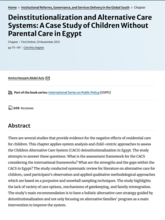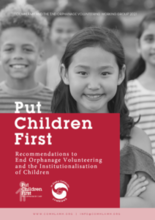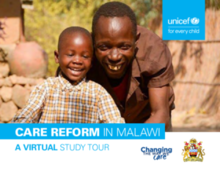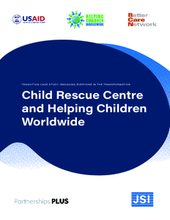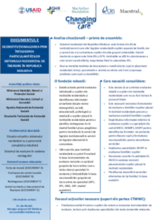Displaying 91 - 100 of 678
Esta herramienta tiene como objetivo ayudar a los profesionales a lograr los siguientes objetivos al brindar apoyo técnico a las instituciones en transición:
Este estudio de caso destaca algunos de los requisitos previos para el punto de partida de una transición exitosa de la atención residencial a un modelo no residencial, muchos de los cuales a menudo se pasan por alto o se subestiman. El estudio de caso se organiza en torno a las distintas etapas de la transición y explora algunos de los temas clave descritos en la Herramienta de evaluación de modelos de atención en transición.
There are several studies that provide evidence for the negative effects of residential care for children. This chapter applies system analysis and child-centric approaches to assess the Children Alternative Care System (CACS) deinstitutionalization in Egypt.
Research has shown the harm of orphanage care on children’s health, development and wellbeing and how orphanage volunteering is working to perpetuate these institutional systems which separate children from their families and communities. There is now a global movement to end both practices. These key policy recommendations were published as part of the "Put Children First: End Orphanage Care" campaign.
This virtual study tour aims to provide you with an overview of care reform in Malawi from the comfort of your own home. Care reform relates to the care of children. It refers to efforts to improve the legal and policy frameworks, structures, services, supports and resources that determine and deliver alternative care, prevent family separation and support families to care for children well.
The current article investigated the financial impact of transitioning to a family-based model of care, donor engagement practices used in this process, and changes in donor support resulting from the transition.
The Child Rescue Centre was the first orphanage in Sierra Leone to successfully complete a transition from residential to family-based care. This case study highlights some of the key dynamics that arose throughout the transition of the orphanage and examines how those dynamics both influenced the transition and determined the type of support provided as well as the most appropriate transition strategy.
Research suggests that children develop best in families, but millions currently reside in residential care centers. Using a mixed methods design, the current study examined (1) antecedents to transition, (2) key elements in the process and (3) outcomes of transitioning models of care.
A fost efectuată o evaluare cuprinzătoare a copiilor și adolescenților care trăiesc în îngrijire rezidențială identificând că există un mecanism complex de evaluare, axat pe oferirea unei vederi de 360° asupra nevoilor și interesului superior al copilului.



